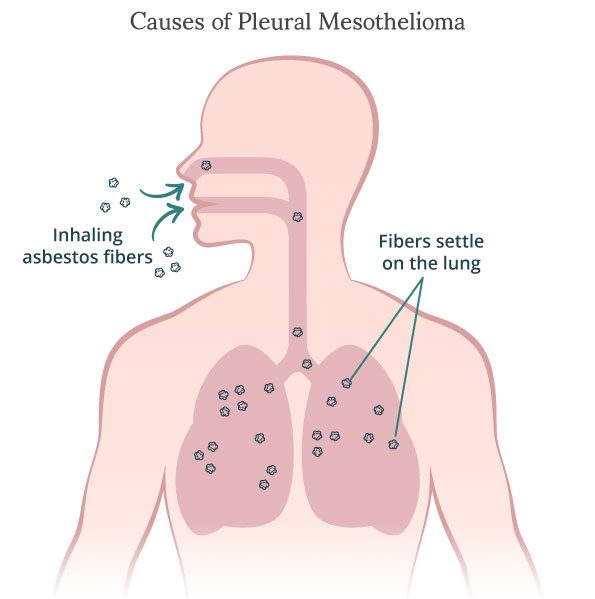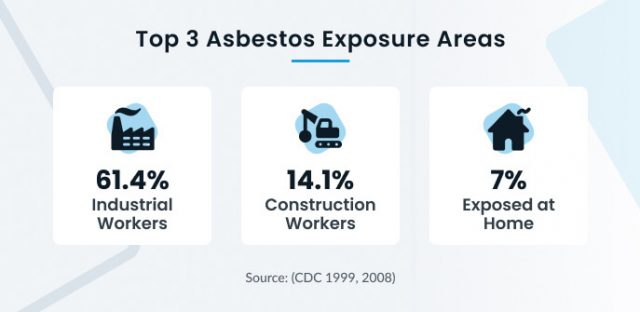What Causes Mesothelioma?
The main cause of mesothelioma is exposure to asbestos.
Doctors first suspected the connection between asbestos and mesothelioma in the 1890s. Research in the 1960s confirmed asbestos exposure as the most important risk factor for the disease.
The heavier the asbestos exposure and the longer a person is exposed throughout their lifetime, the higher the risk for mesothelioma.
Still, even among asbestos-exposed people, pleural mesothelioma is rare. The American Cancer Society estimates there will be approximately 3,000 new cases of mesothelioma in the U.S. in 2019.
How Does Asbestos Cause Mesothelioma?

Pleural mesothelioma develops after a person inhales asbestos. The long, thin fibers pass through the lungs, and they get trapped in the pleura, which is the lining of the lung.
Once trapped, the fibers can trigger tissue damage leading to mesothelioma. This latency period for mesothelioma takes between seven and 70 years.
- Chronic inflammation and cellular injury lead to abnormal cell growth and reproduction.
- Genetic mutations (changes) move cells on the pathway from normal to cancerous.
- Free radical damage causes other cellular changes, leading to cancer.
- The production of cell proteins drives abnormal cell growth and reproduction.
A 2018 study published in Frontiers in Immunology detailed a newly discovered mechanism for how asbestos may lead to mesothelioma.
Asbestos fibers may alter immune function in a way that allows mesothelioma cancer cells to develop unchecked by normal immunity.

Is Asbestos the Only Cause of Mesothelioma?
Although mesothelioma can occur without previous asbestos exposure, this is exceedingly rare.
More than 80 percent of pleural mesothelioma cases are directly caused by asbestos.
In a few very rare instances, radiation exposure may contribute to a person developing mesothelioma. Pediatricians have reported a very small number of spontaneous cases — cancers without any apparent cause — in children.
Genetic Causes of Mesothelioma
Medical researchers have documented a rare genetic mutation called BAP1 that increases mesothelioma risk.
A 2018 study published in the journal Familial Cancer found another potential genetic link to the disease.
In addition to the BAP1 gene, a newly identified, rare mutation in the RBM15 gene also may predispose a person to developing mesothelioma.
Yet even in the family members with the RBM15 mutation, most who developed mesothelioma also had documented histories of asbestos exposure.
The key takeaway: Cancer experts and occupational health scientists agree asbestos exposure is the main cause of pleural mesothelioma.
Where Does Asbestos Exposure Occur?
Patients with pleural mesothelioma have reported several sources of asbestos exposure, but the majority of exposures have occurred at industrial job sites.
Until the 1980s, many worksites, including refineries, construction sites and power plants, were heavily contaminated with asbestos. Some workers sustained long-term, high-dose asbestos exposure over the course of their careers.
This type of heavy exposure is more likely to lead to asbestos-related diseases such as pleural mesothelioma.
Short-term and one-time asbestos exposures, such as what might occur in a home remodeling project or homeowner installation of loose-fill insulation, are much less likely to cause health problems.

Occupational Asbestos Exposure Risk
People previously employed in certain industries and workplaces have a higher likelihood of experiencing long-term asbestos exposure.
- Jeffrey Asbestos Mine
- WR Grace Vermiculite Plant
- National Gypsum drywall manufacturing facilities
- Other heavy construction sites
Secondhand Asbestos Exposure
Some people have been exposed to asbestos carried home on the clothing or skin of an asbestos worker. This is known as secondhand exposure.
Cases of pleural mesothelioma after secondhand asbestos exposure show that even a small level of asbestos exposure can cause disease, if it occurs over a long period of time.
However, most cases of mesothelioma are attributed to direct occupational exposure.

Military Asbestos Exposure
Some veterans have a history of asbestos exposure from living on a ship or other vessels, and working at shipyards and other military facilities.
- Todd Shipyards
- Hunters Point Naval Shipyard
- USS Alabama
- Fort Bragg
- Brooklyn Navy Yard
Environmental Asbestos Exposure
Some people experience long-term exposure because they live near asbestos mines or naturally occurring asbestos deposits.
Libby, Montana, and Coalinga, California, are areas that face these challenges.
Other Mesothelioma Risk Factors
The most important thing to remember is that the main cause of pleural mesothelioma is long-term, frequent and heavy exposure to asbestos.
The asbestos industry continues to argue that certain types of asbestos do not cause pleural mesothelioma.
However, researchers and mesothelioma experts maintain all types of asbestos — including amphibole and chrysotile — can cause cancer.
Even materials similar to asbestos, including the minerals zeolite, erionite, winchite and richterite, have been linked to some cases of pleural mesothelioma. These are called asbestiform minerals, because they so closely resemble asbestos.
A microbe known as Simian Virus 40 has been studied as a possible contributor to increased mesothelioma risk. Current research on this connection is inconclusive.
Does Smoking Cause Mesothelioma?
Smoking does not directly contribute to risk of mesothelioma.
Smoking weakens the lungs, making them more susceptible to developing asbestos-related lung cancer. Smoking also may worsen breathing problems in people who have been exposed to asbestos.
However, smoking does not increase the risk of mesothelioma in people with a history of asbestos exposure.
Detecting Mesothelioma
Tell your doctor right away if you have a history of asbestos exposure and are experiencing symptoms of mesothelioma such as a chronic and persistent cough, shortness of breath, fatigue or unexplained weight loss.
Your primary care physician can refer you to an expert in pulmonary diseases. Exposure to asbestos may also cause other types of mesothelioma, such as peritoneal or pericardial mesothelioma, which cause gastrointestinal symptoms or heart issues.
Consulting with a specialist who understands mesothelioma is a must for anyone who suspects they may have this asbestos-related disease.


